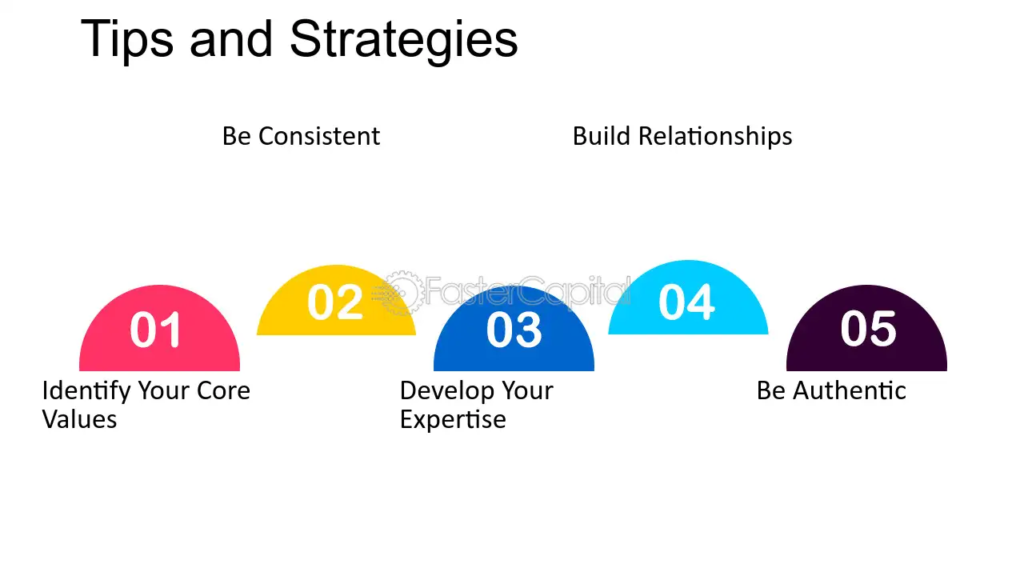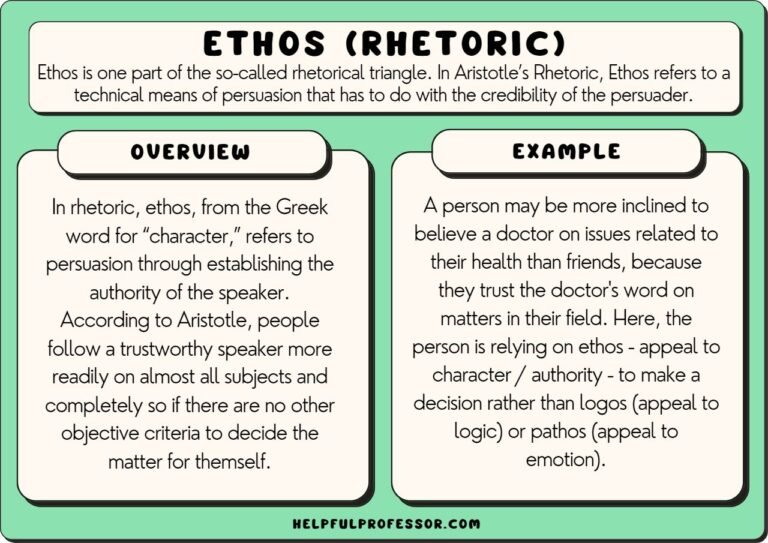Ethos is a powerful tool in communication and persuasion, but it isn’t perfect. People often assume that someone who seems credible or trustworthy is always right. But why doesn’t ethos automatically make something credible? In this article, we’ll dive deep into the concept of ethos, explore its strengths and weaknesses, and uncover why it sometimes falls short of proving credibility.
What Does Ethos Mean in Simple Words?
In simple terms, ethos is a way to establish credibility or trustworthiness. It’s one of the three modes of persuasion, alongside logos (logic) and pathos (emotion), as introduced by Aristotle. Ethos is all about making your audience believe you are knowledgeable, ethical, and worth listening to.
For example, when a doctor gives health advice, their medical degree and experience make them appear credible. This is ethos in action. Similarly, when a celebrity endorses a product, their popularity can give the impression that the product is trustworthy—even if the celebrity has no expertise in that area. Ethos is about perception, not necessarily about fact.
How Ethos Builds Trust
Ethos works by tapping into an audience’s natural inclination to trust people who appear knowledgeable, experienced, or morally upright. This trust can be built in several ways:
- Credentials and Expertise: If someone has relevant qualifications or professional experience, people are more likely to trust their opinions. For example, a scientist with a Ph.D. in climate studies is seen as credible when discussing global warming.
- Reputation and Authority: Public figures, like leaders or experts, often have an established reputation that lends credibility to their statements.
- Moral Character: Audiences are more likely to trust someone who seems honest, ethical, and fair.
When ethos is used effectively, it can make arguments more persuasive. But as we’ll explore, ethos alone isn’t always enough to establish credibility.
Why Do People Use Ethos?
People rely on ethos because it’s often the fastest way to establish trust. Whether in a courtroom, a political speech, or an advertisement, ethos creates an immediate connection between the speaker and the audience. Here are some common reasons why people use ethos:

- To Influence Decisions: A speaker who appears credible can sway opinions or encourage action. For example, a financial expert endorsing an investment strategy might inspire confidence in their audience.
- To Simplify Complex Topics: Experts can break down complicated subjects into simple, understandable ideas, making them seem even more trustworthy.
- To Build Emotional Connections: Ethos helps establish an emotional bond by showing the audience that the speaker shares their values or cares about their concerns.
However, just because someone uses ethos doesn’t mean their arguments are valid or truthful. This brings us to the limitations of ethos.
Can Ethos Be Misused?
Yes, ethos can absolutely be misused. People can manipulate their image to appear credible, even when they lack expertise or have dishonest intentions. This misuse of ethos often happens in:
- Marketing: Companies may hire celebrities to endorse products that the celebrity knows little about.
- Politics: Politicians often present themselves as relatable or trustworthy, even if their actions or policies suggest otherwise.
- Social Media: Influencers frequently market products without fully understanding them, relying on their popularity to appear credible.
In these cases, ethos creates the illusion of trustworthiness, which can mislead people into making poor decisions.
Why Isn’t Ethos Enough to Prove Credibility?
Ethos is powerful, but it has limitations. Relying solely on ethos can lead to biased or incomplete conclusions. Here’s why:
- Perception Isn’t Reality: Just because someone appears credible doesn’t mean they are. A confident speaker may still provide false or misleading information.
- Lack of Evidence: Ethos doesn’t require facts or data. A person’s reputation can overshadow the need for proof, making it easier to spread misinformation.
- Emotional Appeal: Sometimes, ethos is used to manipulate emotions rather than present logical arguments. For example, a politician might appeal to patriotism to gain trust, even if their policies lack substance.
Examples of When Ethos Fails
There are plenty of real-world examples where ethos falls short:
- Celebrity Endorsements Gone Wrong: Celebrities like athletes or actors often endorse products they’ve never used. If the product turns out to be harmful or ineffective, the celebrity’s credibility is damaged, showing that their ethos wasn’t enough.
- Fake Credentials: Some individuals claim false expertise to gain trust. For example, a person pretending to be a doctor might offer medical advice that ends up being harmful.
- Public Scandals: Trusted figures, like politicians or business leaders, can lose credibility when their unethical behavior is exposed, proving that their ethos was superficial.
Popular People vs. Reliable People
One of the biggest problems with ethos is that popularity is often mistaken for reliability. Just because someone is famous or well-known doesn’t mean they’re credible.
For example, a famous actor might have millions of followers on social media, but that doesn’t make them an expert on climate change or health issues. Meanwhile, a lesser-known scientist with decades of research might struggle to gain public attention, even though their expertise is far more reliable.
This highlights the danger of relying on ethos alone—popularity can overshadow genuine knowledge and expertise.
Fake Experts and False Trust
The rise of fake experts is a major challenge in today’s world. These individuals use ethos to appear credible, but their lack of expertise or hidden agendas makes their advice unreliable. Common examples include:
- Pseudoscience Promoters: People who use scientific-sounding language to promote false claims, like anti-vaccine advocates or alternative medicine proponents.
- Influencers Without Expertise: Social media personalities who give advice on health, finance, or relationships without proper qualifications.
- Conspiracy Theorists: Individuals who use fear and distrust to gain a following, even though their arguments lack evidence.
Recognizing fake experts requires critical thinking and a willingness to question appearances.
Mistakes Even Trusted People Make
Even genuinely credible individuals can make mistakes. Nobody is perfect, and relying solely on ethos can blind us to errors or biases. Some common mistakes include:

- Overconfidence: Experts may overestimate their knowledge or give advice outside their area of expertise.
- Biases: Trusted figures can have personal or professional biases that influence their recommendations.
- Outdated Information: A credible source might unknowingly rely on outdated research or facts.
These mistakes show why it’s essential to verify information, even from trusted sources.
How Can You Tell If Someone Is Really Credible?
To determine if someone is truly credible, consider the following:
- Check Their Credentials: Are they qualified to speak on the topic?
- Look for Evidence: Do they provide data or research to support their claims?
- Evaluate Their Track Record: Have they been reliable in the past?
- Watch for Bias: Are they promoting a product, ideology, or agenda?
By asking these questions, you can separate genuine credibility from superficial ethos.
What Makes Something Truly Trustworthy?
Trustworthiness comes from a combination of factors, including:
- Evidence-Based Claims: Arguments supported by facts and data are more reliable than opinions or assumptions.
- Transparency: Honest communication about motives, biases, and limitations builds trust.
- Consistency: People who consistently provide accurate information over time are more likely to be trustworthy.
Facts Matter More Than Reputation
At the end of the day, facts are more important than reputation. Ethos may make someone seem credible, but without evidence, their claims remain unproven. For example:
- A scientist presenting peer-reviewed research is more credible than a celebrity sharing personal anecdotes.
- A journalist citing reliable sources is more trustworthy than an influencer spreading rumors.
Focusing on facts ensures that your decisions are based on reality, not appearances.
Why Ethos Alone Shouldn’t Fool You
While ethos is an important part of persuasion, it’s not enough to establish credibility on its own. A person’s reputation, popularity, or confidence doesn’t guarantee the truth of their statements. Critical thinking, fact-checking, and evaluating evidence are essential for making informed decisions.
The Bottom Line
Ethos is a powerful tool, but it’s not a guarantee of credibility. People can appear trustworthy while spreading false information or making mistakes. By understanding the limitations of ethos and focusing on evidence, you can avoid being misled by appearances. Remember, true credibility comes from a combination of expertise, honesty, and facts—not just a polished image or reputation.


